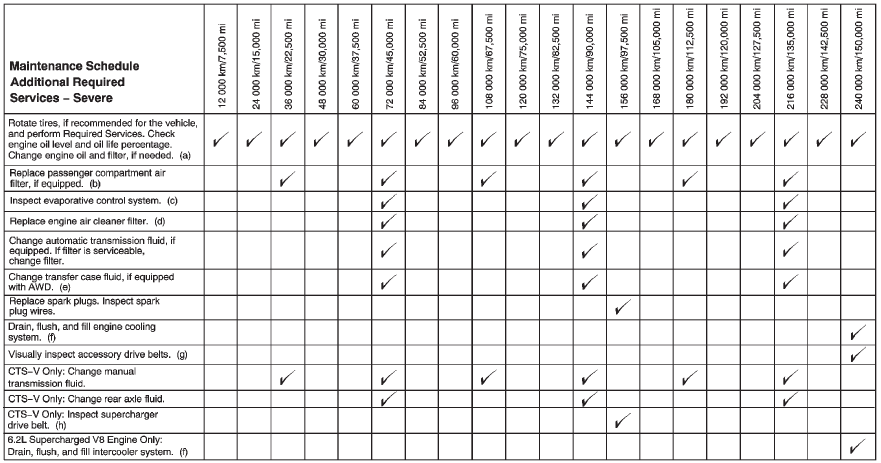Footnotes — Maintenance Schedule Additional Required Services — Normal
a) Vehicles with different size front and rear tires do not have tire rotation. See Tire Rotation.
b) Or every two years, whichever comes first. More frequent replacement may be needed if the vehicle is driven in areas with heavy traffic, areas with poor air quality, or areas with high dust levels.
Replacement may also be needed if there is a reduction in air flow, excessive window fogging, or odors.
c) Check all fuel and vapor lines and hoses for proper hook–up, routing, and condition. Check that the purge valve, if the vehicle has one, works properly. Replace as needed.
d) Or every four years, whichever comes first.
e) Do not directly power wash the transfer case output seals. High pressure water can overcome the seals and contaminate the transfer case fluid. Contaminated fluid will decrease the life of the transfer case and should be replaced.
f) Or every five years, whichever comes first. See Cooling System.
g) Or every 10 years, whichever comes first. Inspect for fraying, excessive cracking, or damage; replace, if needed.
h) Inspect for fraying, excessive cracking, or damage; replace, if needed.

See also:
Driving on a Route
When driving on a routed destination, the map screen automatically displays the
next maneuver.
The pop-up displays the next maneuver direction and the distance from it.
When approximately 400 ...
Playing a CD
Selecting a CD Track
Tracks can be selected using the
seek buttons, TUNE/TONE knob,
or MENU/SELECT knob.
To use the seek buttons:
Press to go to the start
of the current track, if more than ...
StabiliTrak® System
The vehicle has a vehicle stability enhancement system called StabiliTrak. It
is an advanced computer-controlled system that assists the driver with directional
control of the vehicle in difficult ...






